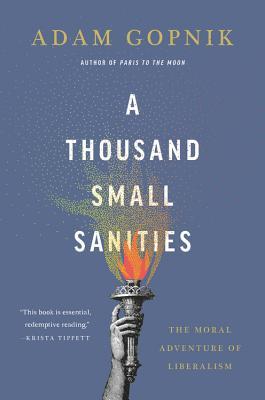
A Thousand Small Sanities
The Moral Adventure of Liberalism
کتاب های مرتبط
- اطلاعات
- نقد و بررسی
- دیدگاه کاربران
نقد و بررسی

Starred review from April 8, 2019
According to this militantly nonfanatical treatise, liberalism is the self-doubting creed of cautious, compromising, incremental reform—and that’s why it’s great. New Yorker essayist Gopnik (Paris to the Moon) grounds liberalism not in arid individualism but in emotion and social connection, an animus against suffering and for freedom and equality, an understanding of human fallibility, a tolerance for debate, and a search for lasting improvements through democratic action. To conservatives who say liberal rationalism erodes communities, families, and sacred values, he replies that it allows diverse communities and religious beliefs to flourish without bitter divisions; to left-wingers who condemn it as a cover for capitalist exploitation, he champions liberalism’s record of progressivism without the totalitarian repressions of communism or the essentialist identity politics of today’s left. Gopnik hangs his discussion on vivid profiles of liberal dreamers and doers, from theorist-lovebirds Harriet Taylor and John Stuart Mill to civil rights pioneers Frederick Douglass and Bayard Rustin. He writes with a pithy, aphoristic charm—“what we have today, the insistent sneering insists, is a long, permanent bar fight, where you can’t trust a liberal to throw a bourbon bottle at the bad guys”—that overlies deep erudition and nuanced analysis. The result is a smart, exhilarating defense of the liberal tradition. Agent: Andrew Wylie, the Wylie Agency.

April 15, 2019
The longtime New Yorker staff writer and prolific cultural critic once again shows his astute awareness of the public's political consciousness in this new work championing "liberalism." In this "distillation and...reduction" of previous essays from the New Yorker over the past 20 years and "a long lifetime's reading of philosophy, history, and biography," Gopnik (At the Strangers' Gate: Arrivals in New York, 2017, etc.) gathers together biographies of and theories from a wide variety of subjects, including Frederick Douglass, Benjamin Disraeli, and James Boswell, in order to define liberalism and clarify its purpose through the ages. Over the course of four discursive chapters, the author demonstrates how these struggles contribute to humanity's incremental improvement: "those thousand small sanities...moving us bit by bit a little bit closer toward the modern Arcadia." Gopnik frames the narrative around a conversation he had on the night of the 2016 U.S. presidential election with his 17-year-old daughter ("A Long Walk with a Smart Daughter"), whom he consoled by explaining why the liberal values her parents brought her up with were "not just some family legacy of attitudes...but ideals that were made reliable by experience and proven true by history." In the "The Rhinoceros Manifesto: What Is Liberalism?" the author shows how the passionate and egalitarian 1850s love affair between John Stuart Mill and Harriet Taylor helped forge one of the first documents on liberalism (Mill's On Liberty). In subsequent chapters, Gopnik examines why the political right hates liberalism--e.g., prizing reason over cultural values, nonbelief in reform--and why the left hates liberalism (the need to be revolutionary). Essentially, the author's "adventure" is not a defense of liberalism as much as a clarification and pieces of fatherly advice for a new generation on liberal reforms and institutions. Gopnik's learned, lofty, occasionally dense study ultimately reasserts the belief in the "infinity of small effects."
COPYRIGHT(2019) Kirkus Reviews, ALL RIGHTS RESERVED.

























دیدگاه کاربران